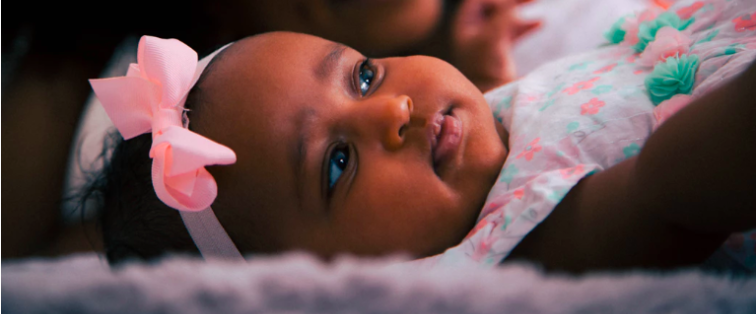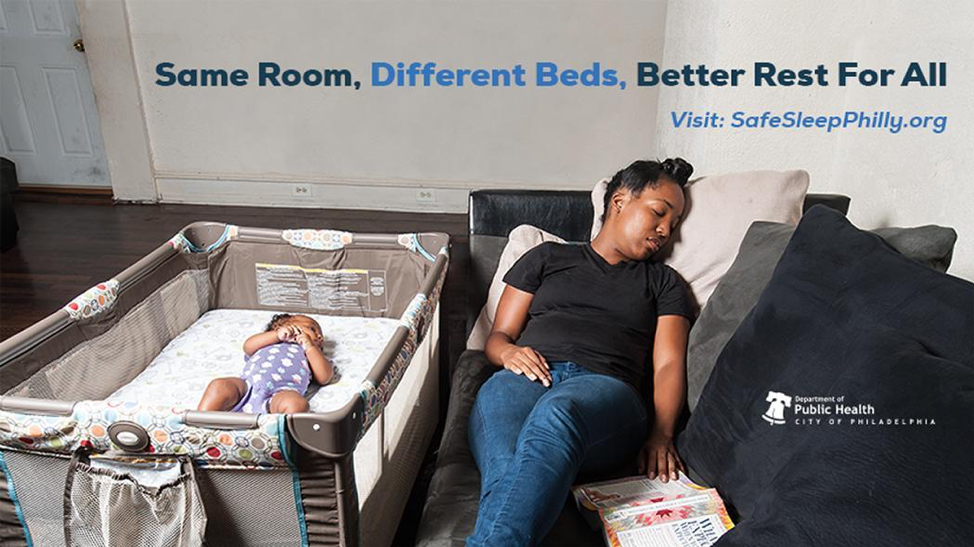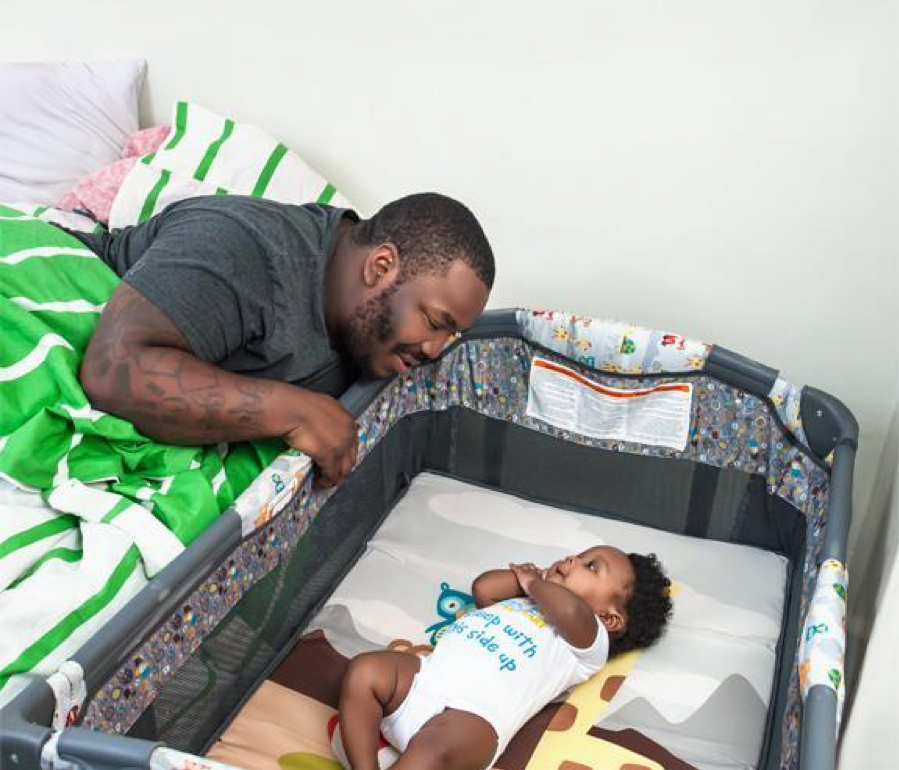With Safe Infant Sleep, We All Rest Better

Editor’s Note: Check out our own Dr. Ariel Williamson’s work that looks at how providing a bed through the Philadelphia Beds for Kids program can impact nightly child sleep, daily child behavior and caregiver mood: https://policylab.chop.edu/project/beds-kids-enhancing-pediatric-sleep-among-low-income-youth
Every night and naptime, many families unintentionally put their babies at risk. Sleep-related infant deaths account for roughly 26% of infant deaths nationally, and for nearly half of the deaths that occur among infants between one month and one year of age here in Philadelphia. While we don’t always know what causes a sleep-related infant death, we do know that with adequate resources and support, there are specific steps families can take to reduce their risk. As recommended by the American Academy of Pediatrics, caregivers should place their baby: alone (without blankets, baby bumpers, pillows or other items), on their back, and on a safe infant sleep surface such as a Pack ’n Play or crib. These steps (Alone, Back, Crib) are often referred to as the ABC’s of safe sleep.
There is no evidence to suggest sleep-related infant deaths are intentional or out of neglect. In fact, many families express wanting to sleep close to their infants out of concern or for protection. I hear anecdotes of unsafe infant sleep occurring when caregivers receive conflicting advice from family members and health professionals; when other caregivers put the baby to sleep while a parent is at work; or when fatigue causes a caregiver to accidentally fall asleep with their infant on a couch or adult bed. Some families simply aren’t aware of the sleep recommendations or don't have the space or resources to create a safe sleep environment.
To reduce infant mortality and honor families’ desire to protect their babies, connecting families to the necessary resources and providing education for the whole family on the ABC’s of safe sleep, including partners and elders, is essential.
Reaching Philadelphia Families to Promote Safe Sleep
In order to effectively reach parents and caregivers, we must first understand the issues facing our communities. Infant mortality rates have decreased over the last few decades, especially since the 1994 national Back to Sleep campaign. However, racial disparities persist nationally and locally. Black families are at a disproportionately greater risk for experiencing infant loss than white families. Beyond inequitable access to quality housing, employment opportunities, and education opportunities, there is supporting evidence that the racial disparity in birth outcomes is rooted in and perpetuated by institutional racism, bias and discrimination. Between 2011-2015, black infants represented 44% of all births in Philadelphia, but 72% of sleep-related deaths. This translated to black infants dying at over three times the rate of white infants.
To address this egregious racial inequity in sleep-related infant deaths, the Philadelphia Department of Public Health (PDPH) launched the Safe Sleep Philly public awareness campaign in 2017. The Philadelphia Fetal Infant Mortality Review team (FIMR) and local parent focus groups steered the development of the campaign, the goal of which is to support all families’ efforts to keep their babies safe at naptime and bedtime and to help more infants reach their first birthday.
Philadelphia data indicated that between 2011 and 2015, nearly 6 out of 10 sleep-related infant deaths occurred while co-sleeping. From focus groups, we learned that families sleep with their infants out of care or concern, or to help them soothe and rest. Recognizing these caregiver concerns, the campaign shares images depicting how real Philadelphia families can be near their babies while still following safe sleep practices in their home. These photos are paired with the positive message: Same Room. Different Beds. Better Rest For All.

When I go to bed at night, I want to make sure that she is okay. I worry that something will happen to her while she is sleeping. I find myself many nights just peeking over there making sure she is okay.” —25-year-old mother of a 4-month-old
Education is just one component of Safe Sleep Philly. To increase equitable access to safe sleep and reduce racial disparities, all materials link to SafeSleepPhilly.org where families can find information to receive free Pack ’n Plays and in-person, culturally concordant safe sleep support. The safe sleep educator connects families to other essential services as well. The website also serves to increase awareness of safe sleep information and to provide free resources for pediatricians and other health care providers who are critical partners in passing safe sleep practices along to caregivers.
It Takes a Team: The Important Role of Dads and Partners
Being a new parent can be exhausting and practicing safe sleep is most feasible with the support of friends and family. Dads and partners play a particularly important role, but as we heard from focus groups, are underrepresented in outreach.
So as part of the campaign, we made sure to create messaging for the whole family. In addition to featuring fathers and partners in campaign materials, PDPH created paper fans celebrating dads’ roles in protecting their infants at sleep-time.
I’ve woken up afraid because I fell asleep with my baby on me after breastfeeding, and felt so relieved because I learned that my partner noticed and put my baby back in her Pack ’n Play. I felt relieved because she was safe.

Expanding Safe Sleep Support for Families
As we develop the campaign, we seek to emphasize the essential role that all members of a baby’s support network play in keeping them safe through their first birthday: dads and partners, grandparents, family, friends and perinatal/pediatric health care providers. We look forward to continuing to work with Philadelphia families and our partners to develop messaging that supports families’ wishes to keep their babies safe and snug, while getting rest.
Julia Reeves is the special projects manager at the Philadelphia Department of Public Health, Division of Maternal, Child, and Family Health. She leads two campaigns (Philly Loves Breastfeeding and Safe Sleep Philly), advises the coordination of the Philadelphia Fetal and Infant Mortality Review team and supervises a fatherhood resources awareness initiative.
